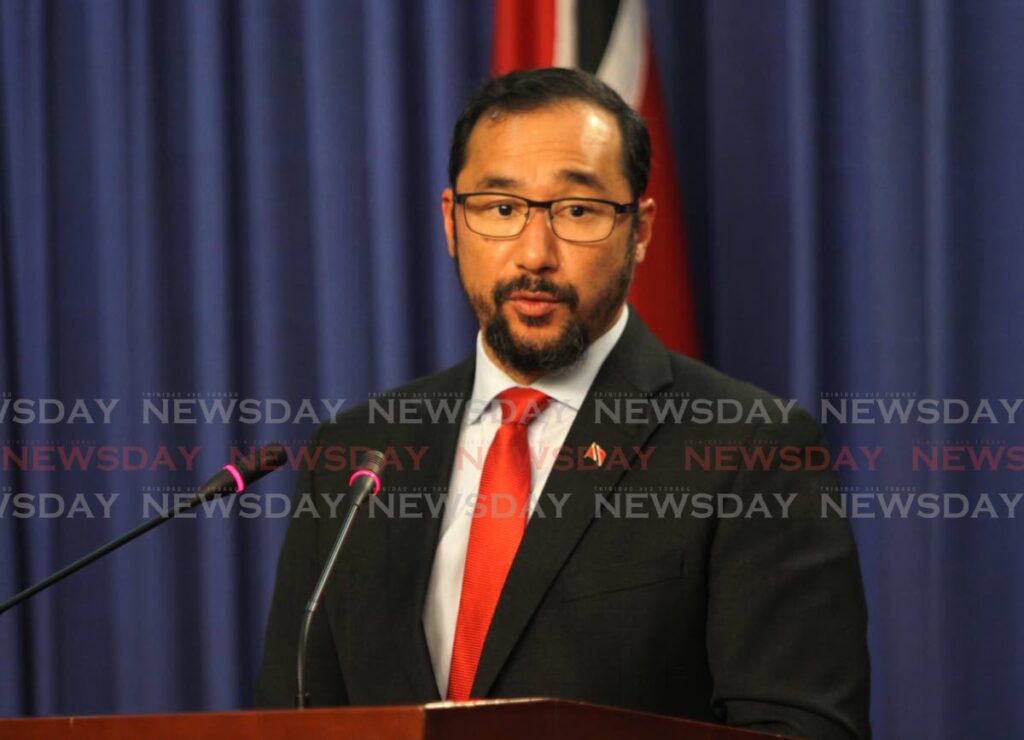Young calls for more talks with US, Venezuela on Dragon gas field

Minister of Energy and Energy Industries Stuart Young has called for further negotiations with the US and Venezuela as TT looks to bring the Dragon gas deal to fruition.
Young delivered the keynote address, Pursuit of Energy Security and Sustainability
- a Caribbean Perspective, at the Energy International Summit of the Association of International Negotiators on June 1 in Miami, Florida.
He said, “TT has become a victim of the geopolitics surrounding our nearest neighbour (Venezuela) and unfortunately, we are experiencing the collateral damage from this.”
Young added, “With respect to TT’s access to the Dragon gas field, both the Prime Minister and myself spent significant time and energy last year meeting with the decision-makers in Washington, DC, negotiating and advocating for a grant of a waiver from Office of Foreign Assets (OFAC) for TT to produce the Dragon gas field with our partner Shell. This included meeting with President Biden at the summit of the Americas, vice president Kamala Harris, congressmen and women on both sides (and) the leadership of the Departments of State, Energy, Agriculture and the Treasury.”
In January, OFAC granted TT a waiver and the government has since been pursuing negotiations with Venezuela over a licence to produce the Dragon gas field.
“With the support of other leaders of Caricom, we pursued the ability to access this gas field, as there is the immediate excess capacity in Trinidad for us to produce additional LNG, ammonia and fertiliser products and methanol, thereby contributing to energy security in the Caricom and wider region. We would be able to provide additional LNG supplies to Caricom countries and even Europe as it looks for alternatives to Russian gas," he said.
Young said TT is looking at deep water as the next frontier for gas exploration and production.
“Our shallow waters have been exploited for decades and are in decline. We are in active negotiations with Woodside on a project called Calypso which holds medium term future for TT's gas production."
Young added that the Ministry of Energy has been negotiating with bp and Shell as a joint consortium on other deepwater blocks and looks forward to the conclusion of those negotiations in the coming weeks.
"As a responsible hydrocarbon country, TT has also been undertaking several new energy projects with the aim of reducing greenhouse-gas emissions," he said.
Young said TT recently turned the
sod for the commencement of the construction of a solar project, in collaboration with bp and Shell, which will produce 112.2 MW of power, ten per of the country's power needs. The government is also exploring the use of wind turbines for power generation. These renewables projects would also feed into the recently Cabinet-approved construction of the first green hydrogen project, which will be done under the direction of the Ministry of Energy.
“TT is actively looking at carbon capture sequestration and utilisation to do our part in carbon reduction but also if done properly and in a public-private partnership (PPP) with our petrochemical stakeholders, it could provide them with the opportunity to 'blue' their products, thereby keeping them competitive in the changing energy landscape.”
Young also used the summit to highlight the challenges the government has faced since it assumed office in 2015.
“We met a crisis in our energy sector that was unprecedented in our country’s long hydrocarbon history. The previous administration, from 2010-2015, negotiated no new upstream gas supply contacts and there was significant gas curtailment that had begun to take place with declining gas production. This had contractual consequences against our National Gas Company (NGC) with claims for damages,” he said.
Young added that the former administration, unbeknownst to the population had implemented a gas allocation policy called a “greenfield gas policy” which mandated that NGC would first allocate and supply gas to newer plants and curtail gas supply to older plants despite the contractual obligations in its various GSCs. This policy immediately exposed the NGC to billions of dollars in claims for breach of its contractual supply obligations. The government went through difficult rounds of negotiations, with down-streamers shutting down plants to pressure the government.
“I can report to you now, that by holding to our principles of fair prices and a fair sharing of upside prices, we were able to secure excellent returns for our citizens in 2022 when ammonia and methanol prices reached highs as a result of the Russia/Ukraine conflict,” he said.

Comments
"Young calls for more talks with US, Venezuela on Dragon gas field"